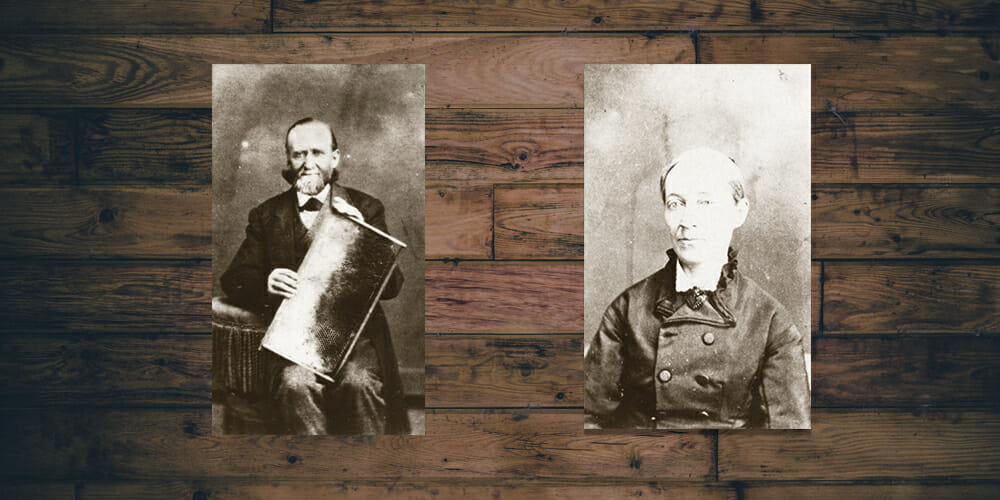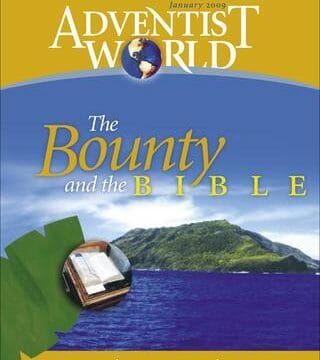The Ellen G. White Estate currently has more than 5,000 letters written by Ellen White. This letter from Ellen White to Abram and […]

The Ellen G. White Estate currently has more than 5,000 letters written by Ellen White. This letter from Ellen White to Abram and Caroline Dodge was published in full for the first time in 2014 in The Ellen G. White Letters and Manuscripts With Annotations, volume 1, pages 319-321. The first volume contains every known Ellen White letter and manuscript for the 15-year period, 1845-1859, including her earliest diary. Volume 2 (1860-1863) is currently in preparation. This text has been edited for space only.
Who Were the Dodges?
Abram A. Dodge (1817-1892) and his wife, Caroline Elizabeth (1830-1915), were active laypersons from Jackson, Michigan (early 1850s), later living in Battle Creek and Coopersville, in the same state. Abram Dodge was remembered by J. N. Loughborough for his “faithfulness
. . . in carrying the workers from place to place in his carriage.” Dodge was a businessman, a dealer in musical instruments, and a clock repairer. . . .
Soon after their marriage in 1851, Abram and Caroline traveled to a conference in Camden, New York. There they met Ellen and James White for the first time and became firm friends with them. . . . Years later, in 1872, Ellen White . . . wrote: “If there was a precious, God-fearing woman in Battle Creek, it was Sister Dodge.”
The Letter
Letter 9, 1851
December 21, 1851
Saratoga Springs, New York
Dear Brother and Sister Dodge:
I have a few moments leisure and will spend them in writing to you. My health has been quite poor for a short time back, but am much better today. At times James and self feel almost worn out. It is seldom we retire before eleven or twelve o’clock at night; we have no idle moments. Were it not for the strength we daily receive from God, we should sink.
Praise the Lord that we have a compassionate, tender High Priest that can be touched with the feelings of our infirmities. We do not expect rest here, No, no. The way to Heaven is a cross-bearing way; the road is straight and narrow, but we will go forward with cheerfulness knowing that the King of glory once trod this way before us. We will not complain of the roughness of the way, but will be meek followers of Jesus, treading in His footsteps. . . . We will not have a murmuring thought because we have trials. God’s dear children always had them, and every trial well endured here will only make us rich in glory. I crave the suffering part. I would not go to heaven without suffering if I could, and see Jesus who suffered so much for us to purchase for us so rich an inheritance; and to see the martyrs who laid down their lives for the truth, and the sake of Jesus. No, no. Let me be perfected through sufferings. I long to be a partaker with Christ of His sufferings, for if I am, I know I shall be partaker with Him of His glory.
Jesus is our pattern. Let us study to have our lives as near like Christ’s as possible. My soul cries out after the living God. My very being longs after Him. Oh, for to reflect His lovely image perfectly! Oh, for to be wholly consecrated to Him! Oh, how hard it is for dear self to die. We can rejoice in a whole Saviour; One that saves us from all sin. We can be shut in with God where we can daily say, “I live yet not I, for Jesus Christ liveth in me to will and do of His own good pleasure.” Glory be to God. I know that my life is hid with Christ in God. The curtain has been lifted, I have seen the rich reward laid up for the saints. I have had a taste of the joys of the world to come, and it has spoiled this world for me. My affections, my interests, hopes, my all is in heaven. I long to see the King in His beauty, Him whom my soul loveth. Heaven, sweet heaven. “I long to be there; and the thought that ’tis near, makes me almost impatient for Christ to appear.” . . . Let us have faith, living faith in God, and love one another as God has loved us. We are very apt to see faults in others, and are not so quick to discover our own faults. If it were the daily study of each of us to show ourselves approved unto God, and should [we] seek earnestly to glorify God, and not have our own will and not please ourselves, I know we should be strong and flourish in the vine. . . . The voice of the angel seems to ring in my ears tonight so loud and clear, Get ready, get ready, get ready, lest ye be weighed in the balance and found wanting.
Christ will have a church to present to His Father without spot or wrinkle or any such thing, and as He leads us through the pearly gates of the golden city, He will look upon the purchase of His blood, His redeemed children, and see the travail of His soul and be satisfied. I long to see the lovely Jesus whose countenance lights up the glorious city; Him whom angels adore, and as they bow, cast their glittering crowns before Him, and then touch their golden harps and fill heaven with their rich music, of songs to the Lamb.
The language of my soul is, “Though dark are the waters, and rough is the wave, if Jesus permits the wild surges, I’ll brave. For that heavenly music hath ravished me so, I’ll join in the chorus, I’ll go, let me go.” My soul is on wing for glory.
Dear Brother and Sister, I have not forgotten the seasons we had together at Milton [New York] Conference. May the Lord strengthen and bring you through every trial, that you may come off victorious. We are to overcome by the blood of the Lamb and the word of our testimony. . . . Next Tuesday or Wednesday we start on our way for the Camden [New York] Conference. If Jesus only comes up to the feast (and I believe He will), we shall have a glorious meeting. I know if we are as humble as we ought to be, and realize from whence our strength cometh, and have faith, living faith, God will work mightily for us, and His stately steppings will be seen among us.
James . . . is very busy correcting proof sheet. Sister Annie Smith is assisting him, and that gives me a little time to write. I have written this evening after the Sabbath by candlelight, with aching eyes, so you must excuse poor writing. Be of good courage. Do not let anything sink you down and discourage you. Remember we are almost home. Much love to all the brethren and sisters in Michigan, especially those that I have seen and am acquainted with. Tell them to be of good cheer. . . . Dear Brother and Sister, do write us; we should love to hear from you and the brethren and sisters in Jackson [Michigan]. James and self send love to you and all that love Jesus.
In haste and love,
Ellen G. White
Notes
“Night before last,” Ellen White wrote one week earlier, “we sat up and wrapped and folded [the Review]” “until past one o’clock A.M.” (Lt 5, 1851 [Dec. 14]).
Lines taken from the hymn “I Long to Be There,” first published among Sabbathkeeping Adventists by James White in Hymns for Second Advent Believers, 1852. For more on the publication history of this hymn, see James R. Nix, Early Advent Singing.
Lines from the hymn “What Heavenly Music,” included in James White’s first hymnal, Hymns for God’s Peculiar People, 1849. For more on the publication history of this hymn, see James R. Nix, Early Advent Singing.
Abram Dodge, with his bride of just a few months, had made the lengthy journey together with other believers from Jackson, Michigan, to attend the conference in Camden, New York, June 20-22, 1851. It is not certain whether they also attended the West Milton, New York, conference the following weekend. There was subsequently a second conference advertised for West Milton, three months later, September 19-21, 1851. Hence, when Ellen White writes of her meeting with the Dodges at the “Milton Conference,” it is not clear which Milton conference she is referring to.
Annie Rebekah Smith, 23-year-old sister of future Review editor Uriah Smith, had recently joined the Review team as editorial assistant. In a letter written one month earlier Ellen White expressed her feelings about Annie Smith: “She is just the help we need. She takes right hold with James and helps him much. We can leave her now to get off the papers and can go out more among the flock.”








